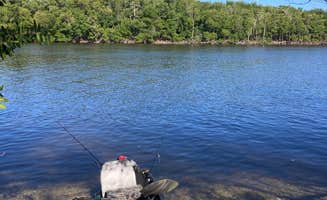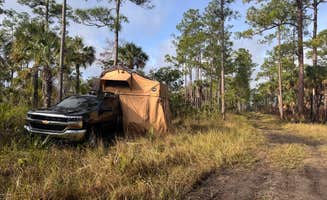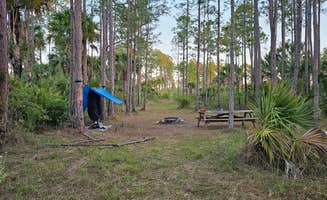Dispersed camping near Copeland, Florida encompasses primitive sites within Big Cypress National Preserve and Everglades National Park. These wilderness areas sit at elevations near sea level, with seasonal water fluctuations affecting trail conditions from May to October during the wet season. Winter months from November through April provide drier conditions with temperatures averaging 65-80°F during the day and 45-60°F at night.
What to do
Paddle to remote platforms: The Everglades chickee platforms offer a unique rustic camping experience accessible only by water. At Backcountry Crooked Creek Chickee, one camper noted, "This can be a tough adventure if paddling. Make sure you go with the tide, it was moving 3-4 during my paddle."
Wildlife observation: Big Cypress National Preserve hosts diverse wildlife including alligators, Florida panthers, and numerous bird species. Camping sites provide natural observation points for patient visitors. The water beneath the chickee platforms often attracts marine life, with one camper reporting, "Stay quiet and look under the platform, tarpon, snook and drum were always around."
Hiking the Florida Trail: The Florida National Scenic Trail passes through several primitive camping areas, connecting hikers to remote sites. Panther Camp serves as a convenient rest point for trail users, located "5 miles from the entrance on the Blue trail" according to a recent visitor.
What campers like
Solitude and disconnection: The primitive camps around Copeland offer genuine wilderness experiences away from developed areas. One camper described Nobles Primitive Camp as "Great remote drive out to the primitive site 'old florida'" highlighting its isolation.
No-cost camping options: Multiple sites in Big Cypress National Preserve are available without fees. A camper at Panther Camp confirmed, "There is no cost to stay, no reservations needed. You can fill out a permit from the website. However I have never been asked for it."
Fishing opportunities: Water-based camping sites provide direct access to fishing. The Backcountry Crooked Creek Chickee offers exceptional fishing, with a camper describing it as "epic, even from the chickee" with various fish species regularly present underneath the structure.
What you should know
Access challenges: Many sites require significant effort to reach, whether by hiking or paddling. At Nobles Primitive Camp, a visitor noted, "One way in one way out. It is located next to marsh land. Luckily the access road was drivable with two wheel drive."
Water management: Natural water sources exist but require treatment and awareness of wildlife. At Carpenter Primitive Camp, campers must pack in all water as no reliable sources exist nearby.
Permit requirements: Most sites require permits, which can be obtained through the National Park Service. For Panther Camp, a camper shared practical advice: "You can fill out a permit from the website," though enforcement appears inconsistent.
Insect preparation: Biting insects can be intense during dawn and dusk hours. At Crooked Creek Chickee, one camper warned that "Bugs were tough sunset and sunrise," making insect repellent essential equipment.
Tips for camping with families
Space considerations: Some camps accommodate larger groups better than others. Panther Camp offers ample space as "a tree grove with a picnic table and firepit. Large and maintained by the FTA, space for 10+ tents and hammocks."
Safety awareness: Wildlife encounters require preparation and education. Campers at Panther Camp noted the presence of alligators near water sources: "There is a water hole in the back of the camp which can be filtered. However a gator generally lives there. Better to pack your water in."
Communication planning: Cell service varies significantly between sites. Families can select camps with connectivity if needed, such as Panther Camp where visitors report "Strong cell signal due to cell towers at the rest stop."
Tips from RVers
Alternative accommodations: Most primitive sites near Copeland are not suitable for RVs. For rustic camping near Copeland, Florida with an RV, visitors should consider Ivy Primitive Camp as a possible location to park nearby and hike in to the camping area.
Road conditions: Access roads to primitive camps can be challenging. At Nobles Primitive Camp, "the paved road turns to dirt/gravel" which may be impassable for larger vehicles or during wet conditions.
Seasonal planning: Winter months (November-April) provide the most favorable conditions for accessing remote sites, with drier trails and roads, plus reduced insect activity compared to the wet summer season.




